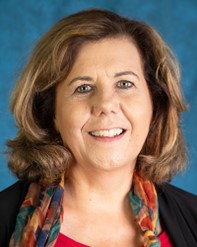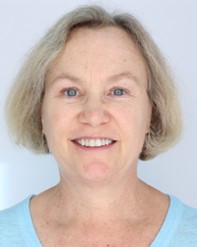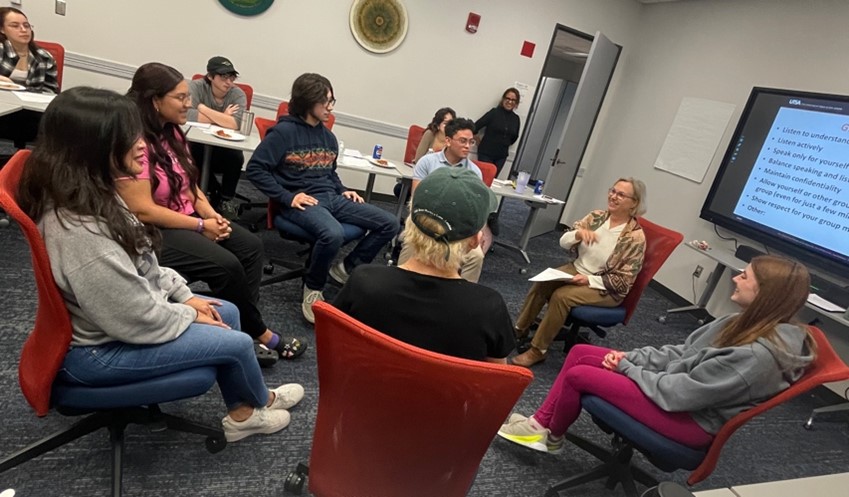- Research
- Centers & Institutes
Drs. Laurie Lewis and Sara DeTurk, both of the Department of Communication, led the effort to establish the Center for Dialogue & Deliberation (CDD) as an official UTSA Organized Research Unit, approved April 24, 2024, by the Deans Research Council (DRC).
The CDD began as the Dialogue & Deliberation Initiative in Fall 2023 as a result of the Visioning exercise in the College of Liberal and Fine Arts (COLFA). A part of that vision included the creation of the Dialogue & Deliberation Initiative as well as the launch of new student involvement opportunities.


Laurie Lewis, Ph.D.
Sara DeTurk, Ph.D.
Dr. Lewis stated, “the initial activities related to this center began in the early 2000s when Dr. DeTurk was training student facilitators to lead dialogue sessions on a variety of topics. When Dr. Lewis joined the Department of Communication full time in 2022, they joined forces to envision and build the Center.
“We saw the need for our UTSA students to master skills in listening and participating in dialogue in order to gain better understanding of others who do not always share their world views and experiences.”
Instead of a mission statement, the CDD describes a “Mandate to Prepare Participants” which includes engaging in diverse perspectives, collaborating effectively in workplaces and deliberating constructively in communities.
Drs. Lewis and DeTurk both express concerns that our society certainly lacks good role models and opportunities to practice empathy, curiosity, collaborative decision-making, and authentic engagement with others who hold differing views. Dr. Lewis stated, “our students often express a reluctance to enter into tough conversations for fear that they will be shouted down, negatively judged, or ignored.” Dr. DeTurk noted that after participating in structured dialogues that the Center hosts, “students often report how refreshing it is to have conversation about difficult topics in a calm, genuine, and supportive way.”
The Center’s vision, similar to UTSA’s vision of “preparing citizen leaders for the global environment,” is that the CDD will enable UTSA students’ career readiness as effective communicators; and contribute to building communicative capacity in the larger San Antonio area.

The Center is already exploring partnerships with organizations off campus including senior centers and high schools in order to accomplish the dual goals to increase communicative capacity among Roadrunners and within San Antonio communities.
The CDD has so far trained hundreds of roadrunners as dialogue facilitators and conducted dozens of dialogue events. Their Student Associate program invites both undergraduate and graduate students, of any major, to participate in the Center’s activities; be trained as facilitators, master communication skills related to listening; designing dialogue, deliberative, and collaborative events; and practice public relations and promotion skills on behalf of CDD.
The Center has a set of affiliated programs. Model UN, The Digital Storytelling project, and the Global Communication initiative are led by faculty with a variety of interests and connections to themes of dialogue and deliberation. These faculty and an advisory board from across UTSA, help to guide the Center and expand its reach and involvement.
One key part of the vision of the CDD is to examine and share what is learned through dialogue and deliberation activity. Dr. DeTurk is currently collecting data from participants in the dialogue sessions that are offered. These data will inform our understanding of how participants estimate their skill and comfort with dialogue before and after participating. Dr. DeTurk’s research agenda includes partnering with community groups that engage in difficult conversations to assess how dialogue tools and engagement impacts important community outcomes.
A key piece of any effective form of communication is understanding the experiences and opposing points of view. This is facilitated by Structured Intergroup Dialogue, which brings people together across difference to engage in controversial topics with the support of skilled facilitation and ground rules. Structured dialogue promotes perspective taking, critical thinking, and understanding of social issues. This process can be used in conflict resolution, but is not intended as a decision-making tool, and agreement is not the goal. The Center offers students opportunities to engage in structured dialogue and to be trained as facilitators. According to Dr. Lewis, “this technique for discussion around difficult topics cultivates empathy for and understanding of diverse perspectives in the world around us. Understanding one another’s lived experiences, stories, ideas, values and concerns are important stepping stones to addressing and resolving our most ‘wicked’ problems in society.”
As the Center develops and receives more funding, Drs. Lewis and DeTurk plan to offer more events and activities that expand the applications of fundamental skills at the heart of this initiative. Dr. Lewis plans to train students to deliberate in a large interaction method that would apply skills in listening, collaborating, and decision-making through a spring course. She aims to eventually host an event of student leaders to make a consequential decision (e.g., allocation of a fund to student-focused initiative) as a means to further the mission of the Center to teach deliberative skills. The Center also engages in trust-building and community-building activities including trivia nights and art-appreciation dialogues incorporating listening and collaborative skills.
The Center for Dialogue & Deliberation hosts several events throughout the year that can be found on their website: https://colfa.utsa.edu/dialogue/ and on Instagram at DialogueUTSA.